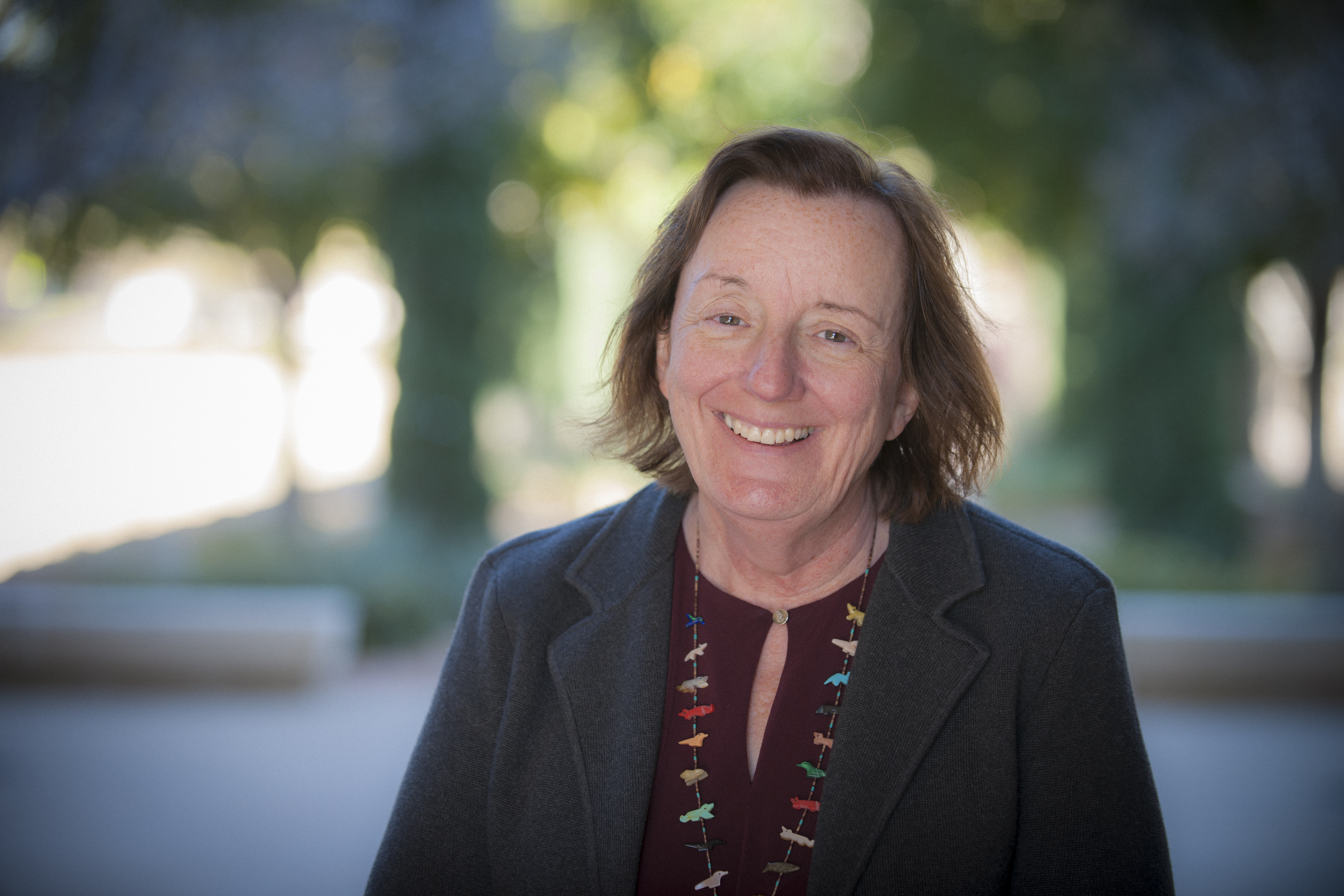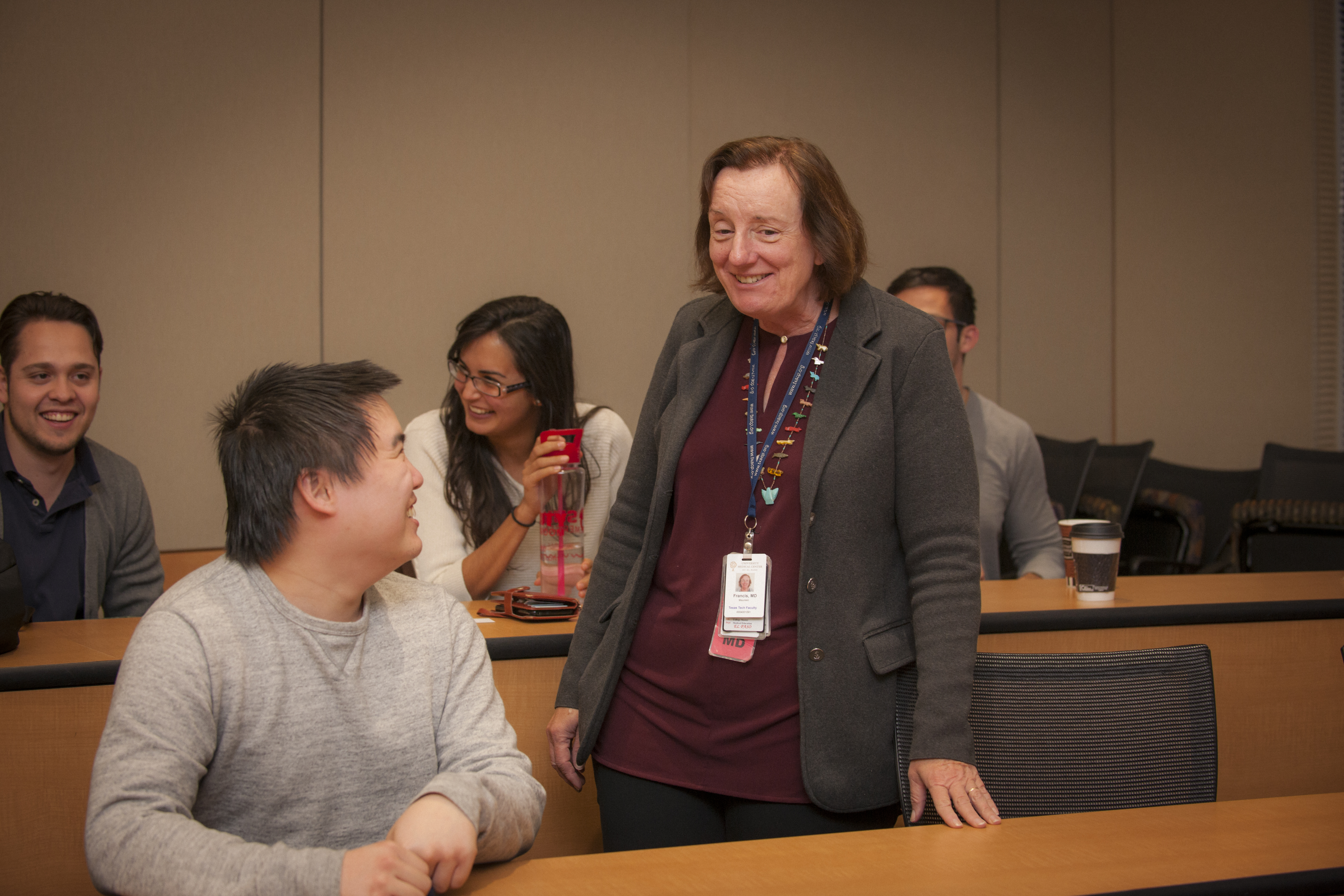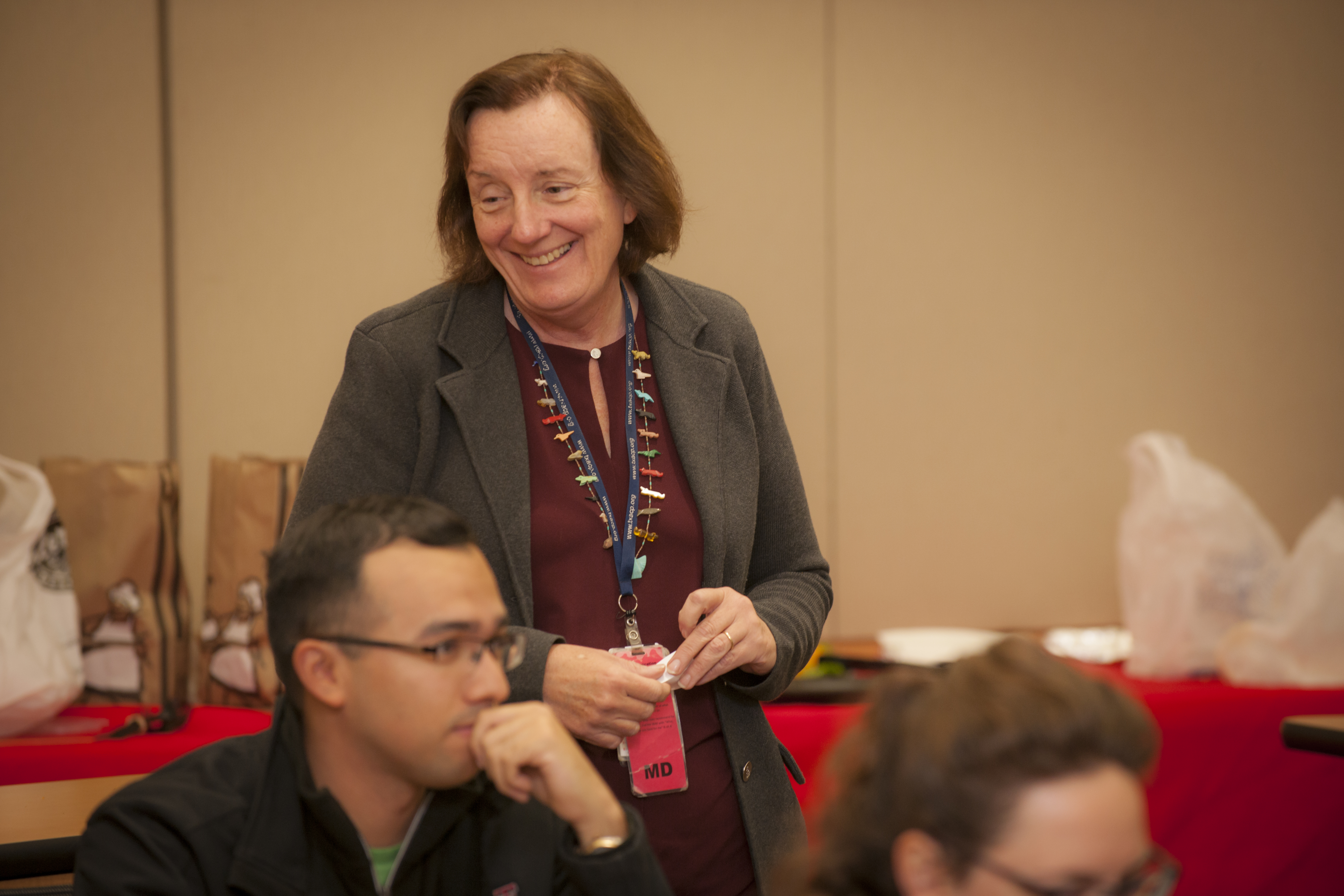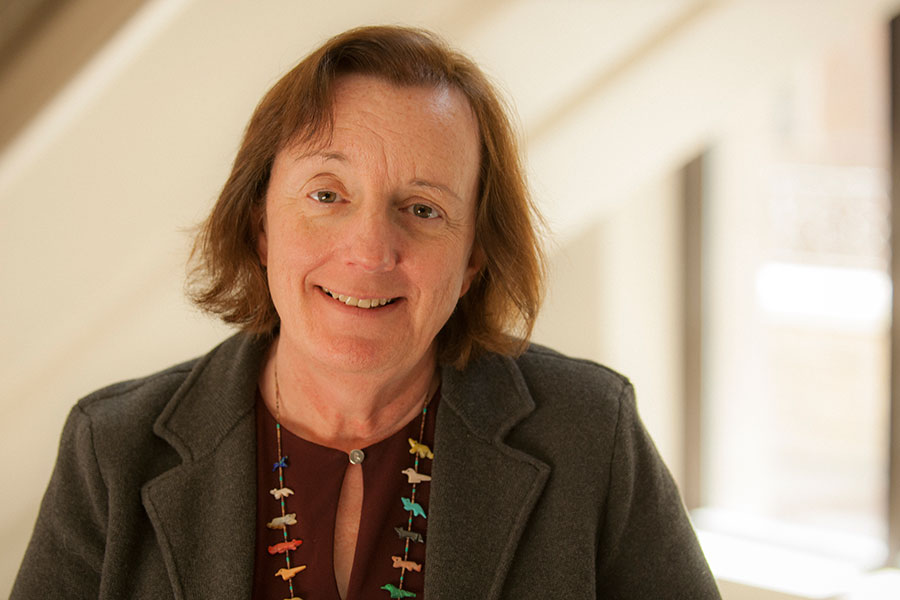
Excellence in Teaching: Francis is the Gold Standard for TTUHSC El Paso
By Amanda Castro-Crist
Take a drive down Interstate 10 from the Texas Tech University Health Sciences Center El Paso (TTUHSC El Paso) campus and soon, you’ll come to Sparks, Texas. Located in the middle of El Paso County near the U.S.-Mexico border, the town is home to fewer than 5,000 people, almost a third of whom are without health care coverage.
It’s where you’ll find the Medical Student Run Clinic (MSRC). Established in 2013, the MSRC is managed by TTUHSC El Paso students under the direct supervision of volunteer physicians and provides primary health services to patients of all ages.
Dr. Maureen Francis was a bit overwhelmed when first approached with the possibility of founding the MSRC. She had just joined TTUHSC El Paso in 2010 and was an associate professor of clinical medicine. Through a public health project, students had identified a need in El Paso county: medical care access for underinsured and uninsured residents.
 “The students wanted so much to help the population and were so enthusiastic and caring;
I couldn't say no,” said Francis. “Once we started, I learned just how much students
can accomplish. They don't think about barriers as something that's going to stop
them. They think of them as things they're going to overcome. It’s been one of the
most rewarding things I’ve been a part of.”
“The students wanted so much to help the population and were so enthusiastic and caring;
I couldn't say no,” said Francis. “Once we started, I learned just how much students
can accomplish. They don't think about barriers as something that's going to stop
them. They think of them as things they're going to overcome. It’s been one of the
most rewarding things I’ve been a part of.”
In 2018, Francis was named a Chancellor’s Council Distinguished Teaching Award winner for her devotion to educating and mentoring students. Now associate dean for Medical Education, she has remained dedicated to teaching students both as a medical director at the clinic and as a faculty member in the medical education and internal medicine departments.
TRANSFORMING LIVES THROUGH SERVICE
Over the years, those at the MSRC have continued to identify new ways to serve the community. When the clinic opened, they quickly realized the need for preventative health care and the lack of sustainable funding for those services.
“A patient needed an investigation of a breast mass, and she didn't have insurance,” Francis said. “We were struggling to find ways to find care for her. Two students said, ‘Let's write a grant.’ I said, ‘Go for it. I'll help you.’ Because of their enthusiasm and drive, we got the grant, and we've had a really strong mammography screening program since then.”
Francis sees this as just one example of her students creating meaningful change. But to students like Nohemi Lopez Valdez, it’s also a testament to how important faculty support is to students who dream big but may lack the tools to make those dreams a reality.
Lopez Valdez first met Francis as part of the TTUHSC El Paso “COVID class,” the group of students who began their medical studies in fall 2020 at the height of the pandemic. Francis served as the mentor for Lopez Valdez and the other students in her year and led the students through their college colloquium course each week, a class that provides guidance, support and critical thinking sessions on various topics throughout the first and second years of medical school.
“Our first semester was all virtual, so that was how I first met her,” Lopez Valdez said. “We discussed things like ethics, humanities, how to survive clerkship and better strategies for studying.”
During the course, Lopez Valdez worked on a group project focused on food insecurity and food deserts in the U.S. That December, she applied and was selected as one of five student directors at the MSRC for 2021. She led patient services and volunteer recruitment and learned from her mentor in a new environment.
As a continuation of her work with the MSRC, Lopez Valdez developed a scholarly research project to investigate the level of food insecurity in the Sparks community and Francis served as her mentor.

“I’d found there was a huge disparity for people trying to access food in the U.S., and El Paso had a greater rate of food insecurity compared to the national rate,” Lopez Valdez said. “Additional factors, such as households with incomes below the federal poverty level, increase the risk of food insecurity. Through screening, we found that many clinic patients were food insecure – nearly three times the overall rate in El Paso."
Today, Lopez Valdez and the current MSRC student leadership team have connected with the local food bank, El Pasoans Fighting Hunger. Soon, they hope to establish a more streamlined process for referrals to connect patients with critical resources. Lopez Valdez, who will graduate this May, said what she learned from the project and at the MSRC will benefit her as she begins a career in pediatrics.
“Food insecurity is a big focus in this field, but it’s not something you can know just by looking at a person,” she said. “You find out through talking to patients and noticing behaviors, like when a child is unable to focus, and through critical thinking.”
Among all the things she’s enjoyed during her four years at TTUHSC El Paso, Lopez Valdez said the greatest experience of her medical education was serving as a student director at the MSRC.
“It was an amazing opportunity to serve my community and work alongside physicians like Dr. Francis,” Lopez Valdez said. “I grew as a student and a future pediatrician, and I learned about the different needs that exist in communities and how to work with community organizations on various initiatives.”
She said serving alongside Francis showed her the type of doctor she hopes to one day become.
“Working with her at the MSRC, you can truly see her dedication and passion for serving the El Paso community – specifically underserved communities and patients without health insurance – and helping them get access to the care they need,” Lopez Valdez said. “I am so grateful for her guidance through medical school, my research project at the MSRC and during my time as a student leader at the MSRC. As a teacher, as a physician, Dr. Francis is just amazing. When you get the chance to observe her, you want to be her.”
Those moments of bedside observation are a highlight for Francis, too.
“I've taught in the classroom and discussion-based courses,” Francis said. “Going bedside with students is still my favorite part of teaching.”
Being part of a team allows Francis and her students to learn from each other, and she’s not afraid to let the students know when she’s stumped alongside them or praise them when they’ve thought of something that hadn’t crossed her mind.
“If there's a puzzle, it's great to sit at the table and talk about what it could it be or what we might have missed,” she said. “I like seeing them with the patients and the light bulb going off when they recognize a particular condition or figure out a diagnosis.”
ACHIEVING EXCELLENCE IN THE BORDERPLEX
Francis sets high expectations for herself and her students when it comes to patient care and interactions.
“Patients put their trust in us, and we have to take that seriously,” she said. “I want them to have confidence in themselves, to be inquisitive and to learn, but to also hold themselves to the highest standards and understand the importance of patient-centered care, and that they should interact with everyone respectfully, no matter the patient’s circumstances or point in life. I hope I can show them they can have joy in their work and not just get swallowed up in the enormity of the job.”
Recognition for excellence in teaching should not have come as a surprise – Francis has received numerous accolades from her colleagues, university leadership and students, including her selection into the Gold Humanism Honor Society, an honor given to those who are seen as compassionate, caring and empathetic advocates for their patients. It’s something she strives to embody and instill in her students.
Despite her other recognitions, being named a Chancellor’s Council award recipient at TTUHSC El Paso was a humbling experience.
“I knew some of the previous years’ recipients, and they were all considered giants among us,” Francis said. “I was extremely honored to be nominated and amazed to know people thought I deserved it.”
One of those recipients was her close friend, Janet Piskurich, Ph.D., an immunology and microbiology professor who received the award in 2015.
“She was my partner from the time I joined the Department of Medical Education until she retired a couple of years ago,” Francis said. “Together, we mentored and developed a strong bond as we learned about teaching medical students. She passed away last year. I really looked up to her, and I miss her a lot.”
Francis said her own educational journey also has impacted her teaching. She completed her undergraduate studies in biophysics at the University of Pennsylvania before completing her medical degree at Jefferson Medical College.
“I grew up in Philadelphia and was the first in my family to go to college and medical school,” Francis said. “Penn is an Ivy League school, and one of the more expensive ones, and I was fortunate that they had a great program where I was able to get a lot of need-based financial support. But medical school was a challenge to finance, so I joined the Army Health Professions Scholarship Program.”
Her residency brought her to Texas and provided her first experience in El Paso at William Beaumont Army Medical Center. It was where she met her husband, Mark, who was also studying medicine.
“My husband is from Colorado, so we were both new to the area,” she said. “Our journey and military service took us to several places after we left El Paso, but we fell in love with the southwest and our love for the city was always there. We liked the climate, the culture and being with people from a lot of different backgrounds. We always wanted to come back and serve the area.”

After the last of their three children graduated high school and left home, they heard a new medical school had been established in El Paso – what would become today’s Paul L. Foster School of Medicine.
“We thought, our children are off doing their own thing, this is a great time to go back to the southwest, to the place we love and where we met,” Francis said. “So we came back to El Paso in 2010, and we’ve been here since then.”
She doesn’t shy away from sharing her background with her students, many of whom face similar struggles as they complete their degrees.
“I tell them I am a first-generation student,” Francis said. “My parents were not wealthy and couldn't really afford to send me to school. I had to find other ways, and I still remember how difficult it was. But I understand that overwhelming desire to want to help people, to become a doctor. I think that resonates with a lot of the students today who have similar drive and commitment. They rise to the occasion, and they accomplish it. We just have to get out there and let young people see that they can do it too.”
Her accomplishments – in teaching and beyond – have impacted far more than the lives of her students and the people of El Paso. Each of her three children – Emily, Matthew and Laura – have gone on to complete their own journeys in higher education, and she has high hopes for the next generation, her grandchildren, Eleanor and Samuel.
“My family is my biggest joy,” she added.
Looking back on her time in El Paso, Francis said while she knows receiving the Distinguished Teaching Award is certainly beneficial to a faculty member’s career, the impact goes far beyond that.
“It brings this kind of respect from others, a little more buy-in for projects, a chance to get in someone’s ear and open doors when we’ve needed something for the students or the population,” she said. “We might not be able to do everything, but little by little, we can try to do a bit every day to make a difference.”

